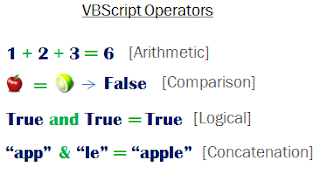 We have used these operators many times knowingly or
unknowingly.It was when we added the marks in English and Mathematics and also
when we concatenated strings nothing but linked too strings in the code sample
#2. An Operator is nothing but it works either on values or variables to perform
some task. Operators are very important in programming because you cannot
assign values to variables or perform tasks without these operators.
We have used these operators many times knowingly or
unknowingly.It was when we added the marks in English and Mathematics and also
when we concatenated strings nothing but linked too strings in the code sample
#2. An Operator is nothing but it works either on values or variables to perform
some task. Operators are very important in programming because you cannot
assign values to variables or perform tasks without these operators.Suppose, you want to calculate the sum of two variables a and b and save the result in another variable c.Then we have to assign variables a, b and c.
c = a + b
Here, a, b and c are operands and + and = are the operators. VB scripting also consists of operators.
- Arithmetic Operators
- Comparison Operators
- Logical Operators
- Concatenation Operator
Arithmetic Operators:
These operators are used to perform mathematical operations. Arithmetic operators are nothing but addition , subtraction , multiplication, division, exponent, modulus. For the better understanding we can follow the below table.
Operator
|
What it Does
|
Example
|
+
|
Addition of numbers
|
3+5 = 8
|
-
|
Subtraction of numbers
|
7-5 = 2
|
/
|
Finds the quotient when a number is divided by another
|
5/3 = 1, 9/3 = 3, 15/2 = 7
|
*
|
Multiplication of numbers
|
2*5*3 = 30
|
^
|
Exponent. Computes the power.
|
2^3 = 8, 3^2 = 9
|
Mod
|
Finds the remainder when a number is divided by another.
|
5 mod 3 = 2, 9 mod 5 = 4, 10 mod 5 = 0
|
Comparison Operators:
Comparison operators are used to compare different numbers/strings and are mostly used in conditional statements such as If condition.
Operator
|
What
it Does
|
Example
|
=
|
Checks
if a number/string is equal to another
|
5=5
is True, “abc”=”def” is False
|
>
|
Checks
if a number is greater than the other
|
10
> 5 is True
|
<
|
Checks
if a number is less than the other
|
10
< 5 is False
|
>=
|
Checks
for greater than or equal to
|
5
>= 5 is True
|
<=
|
Checks
for less than or equal to
|
10
<= 10 is True
|
<>
|
Checks
if a number or string is not equal to another
|
10
<> 5 is True, “abc” <> “def” is True
|
Logical Operators:
Logical operators help you get some result based on certain set of conditions. For example, if ‘today is holiday’ and ‘its not raining’ then ‘i will play outside’. Some of the logical operators are AND, OR, NOT and XOR. Suppose, you have two variables x and y with values true and false respectively
Operator
|
What
it Does
|
Example
|
And
|
All
conditions must be true for the output to hold.
|
If
var > 99 and var < 1000 then var is a three digit number.
|
Or
|
Output
holds if any of the conditions is true.
|
If
num = 50 or num = 100 then num is divisible by 10.
|
Not
|
Inverts
the result. If value is true, Not converts it to false. If value is false,
Not converts it to true.
|
tr
= True
fl = False msgbox NOT(tr) ’will display False msgbox NOT(fl) ‘will display True |
Concatenation Operators:
Concatenation operator is used to concatenate or join strings. Concatenation is nothing but linking two things or objects. So the name itself suggests that this operator is used to link two variables or strings or values.There is only one concatenation operator – & (ampersand)
Operator
|
What it Does
|
Example
|
&
|
Used to concatenate two or
more strings.
|
“auto” & “mat” & “ion”
-> “automation”.
|
So this is all about the operators in Vbscripting.
No comments:
Post a Comment